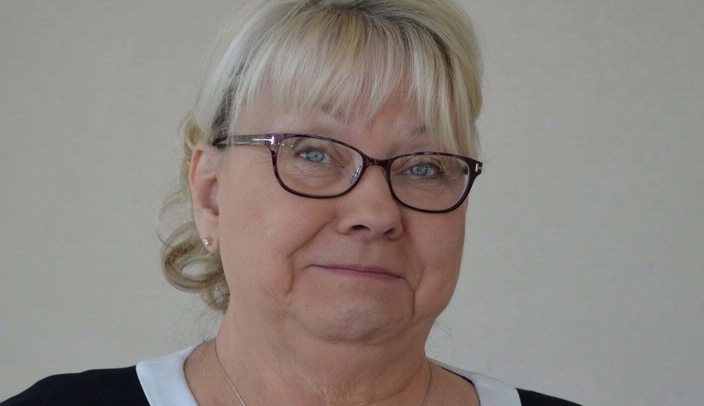The University of Nebraska Medical Center College of Nursing has received a $100,000, two-year grant to develop an innovative model focusing on care of older patients being transitioned from a hospital or home setting to a skilled nursing facility.
One of the impetuses for the grant is a study by the U.S. Office of the Inspector General that cited a loss of $2.8 billion in 2014 because of poor transitions from acute care into skilled nursing facilities, Dr. Chaperon said.
Interprofessional teams will focus on critical areas to safely transition patients, including communication of patient information, evidence-based geriatric assessments and care plans. The teams will participate in teamwork education, lectures, simulation exercises and culminate with the students and clinical staff putting the training into practice.
The grant will involve training UNMC pharmacy students and UNMC nurse practitioner students, as well as clinical partners, the Rehabilitation Center of Omaha and Ambassador Health of Omaha, two skilled nursing facilities that serve older adults. The grant was awarded by the Accelerating Interprofessional Community-Based Education and Practice program of the National Center for Interprofessional Practice and Education.
“This grant fits where education is going,” said Claudia Chaperon, Ph.D., principal investigator of the grant and associate professor, UNMC College of Nursing. “Interprofessional team education can make a difference in the safe transition of patients.”
She said the report indicated that nationally 33 percent of patients admitted to skilled nursing facilities have some kind of a preventable adverse event in the first week or two and about half end up back in the hospital.
“Communication from the hospital to skilled nursing facilities is sometimes lost or lacking. We need to change,” Dr. Chaperon said. “We’re going to teach students together about assessing/evaluating complex patients. The unique thing about this initiative is our clinical partners will participate in the clinical education scenarios with our students.”
Patients in skilled nursing facilities are not well enough to go home but no longer need to be hospitalized. They need skilled assessment or evaluation and around-the-clock nursing care.
Dr. Chaperon said the community-based clinical teams were selected because they are already doing some great interdisciplinary work.
“Our community folks are experienced. This has the potential to enhance collaborative practice and education,” she said. “Our goal is to improve patient-centered care — meaning all members of the health care team work together to improve quality and care of the patient.”
Timothy Juilfs, president and owner of Ambassador Health, donated $50,000 in matching funds for the grant. He has worked in the skilled nursing facility field for 43 years and has seen some of the problems that can happen when communication and coordination breaks down in the transition process.
Ambassador, which employs 550 and cares for 380 patients a day, has three skilled nursing facilities in Nebraska and one in Iowa.
“I’m very excited to help introduce this educational model into our program. I think the outcomes will be fantastic in the years to come,” Juilfs said. “It will help health professionals as they go out into the world.
“So many seniors are on multiple medicines and experience drug-to-drug interactions or take inappropriate medications that can result in being readmitted to a hospital or skilled nursing facility. The more we can help train students to work together to prevent these problems the more likely we will have new graduates better prepared to achieve better outcomes. It will take more planning and coordination with a team approach to avoid these problems.”
The project will involve UNMC faculty: College of Nursing, Jessica Nielsen, D.N.P. (Omaha Division), Marge Kaiser, Ph.D., (Omaha Division), Nancy Meier, gerontological nurse practitioner (West Nebraska Division); the College of Pharmacy — Dean Collier, Pharm.D., and Linda Sobeski, Pharm.D., and College of Medicine Rebecca Wester, M.D.
The grant is made possible through the support of the Robert Wood Johnson Foundation, The John A. Hartford Foundation, the Josiah Macy Jr. Foundation and the Gordon and Betty Moore Foundation. Through these partnerships, programs will accelerate their existing interprofessional work. The Nebraska Action Coalition – Future of Nursing and Rehabilitation Center of Omaha also made financial contributions to the project.
What others are saying
Dean Collier, associate professor in the UNMC College of Pharmacy
“The college is excited to be part of the grant and involved with moving inter-professional education forward and into a community setting. It’s an opportunity for us to work with some new community partners and learn from our community partners how we can work together to improve patient care. We’re going to learn from them and they’re going to learn things from us – to work on strategies to improve aspects of patient care in transitioning patients.”
Rebecca Hynes, skilled rehabilitation unit manager at Ambassador Health of Omaha
“Ambassador is honored to collaborate as educational partners with UNMC. This opportunity will allow us to further enhance the level of services and care provided to our patients during the transition from hospital to skilled nursing, then back into their community.”
Heather Brown, director of nursing, the Rehabilitation Center of Omaha
“We are excited to participate in a grant that will promote improved interdisciplinary collaboration that means better care for our patients.”
We are Nebraska Medicine and UNMC. Our mission is to lead the world in transforming lives to create a healthy future for all individuals and communities through premier educational programs, innovative research and extraordinary patient care.
Twitter | Facebook | Instagram | YouTube | Flickr
